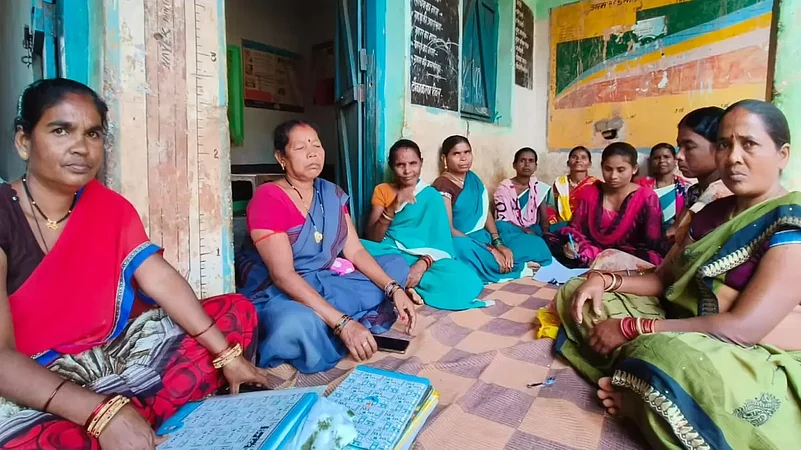Every morning for the past 16 years, save on the weekends, Sukara Sinha has walked for two hours from her home in Palnar village of rural Dantewada in Chhattisgarh’s militarised Bastar district to reach her office in the remote Tikanpal gram panchayat. Here, she meets with her team of Anganwadi workers and discusses health statistics and medicine requirements. About a dozen women sit at the two room centre located at the mouth of the village. They count the medicine and vaccination stocks and list the ones that need restocking. Dystentry medicine, cough syrups, fever medicines and contraceptive pills are heavily in demand along with iron and haemoglobin supplements for women and children. “Maintaining inventory is boring but essential as it takes a while for medicines to reach us,” she states.
Speaking about the challenges of administering health services in the Naxal belts of Bastar, Sukara says that their work goes on unhindered, no matter what. “There is violence on both sides but both sides tend to not target health workers in the region,” she states.
Nevertheless, the lack of motorable roads connecting villages to key regions is a big issue for women like her. “Moreover, even when there are roads, there are no lights. I and my team spend nearly two hours in the evening returning home and it gets pretty dark,” Sukara adds.
She and other anganwadi workers like Savirtri Alami who lives and works in Korgaon near Pahurnar in Dantewada have demanded rooms for anganwadi workers in the villages where their centres are located. “It saves us a lot of time in travel and also makes it safer for the women,” Alami states.
Women like Savitri and Sukara play a key role in delivering healthcare services and awareness to people in the remote tribal districts of Bastar. However, studies have shown heavy presence of malnutrition in the tribal districts of Chhattisgarh including Bastar. Much of the villages that remain east of the river Indravati in the forested tracts of Abujhmarh hills under Naxal control remain without proper healthcare facilities. Reduction of forest land and increased “developmental” and mining projects in the area have also added to loss of livelihoods for large sections of the rural population.
As per a report published this year in The Wire, a recent report by Chhattisgarh state’s Women and Child Commission based on a scheme called ‘Vajan Tyohar’ (weight festival) has revealed that tribal areas in Bastar have higher rates of malnutrition. Women’s health and hygiene is yet another neglected area. Most interior villages across Bastar remain without running water supply (tap) and a majority of rural homes do not have bathrooms inside them.
Sunita Tamo, who works with the Manila Adhikar Manch in rural Bijapur says that there are no taps in the homes in her village Belnar and that women and girls of menstruating age are forced to go to nearby rivers to relieve themselves or to wash their period cloths. Inherent prejudices against menstruation also lead to women being denied access to vital spaces. While the anganwadi workers do try to talk about these issues of women’s reproductive and sexual health, it’s not an easy task and not all the workers are educated themselves.
“Anganwadi workers and doctors come once or twice a month on their rounds and distribute medicines for general conditions. However, in case of an emergency, villagers across the river have to come to urban centres like Bhaihrampur for which we need to cross rivers on boats,” Tamo states, adding that there are no dispensaries or PHCs in her or her neighbouring villages.
The Bhupesh Baghel government has claimed to have spent Rs 50-60 crores on healthcare schemes for the tribal population in Bastar, especially for tackling malnutrition among women and children. Chhattisgarh has recorded an overall decline in malnutrition in the past few years but the situation in Bastar remains grim. Yet data as per 2022 shows that 24,299 children remain malnourished in Bastar of whom, 6,080 are severely malnourished. The highest concentrations of malnourished children are in blocks like Bakawand, Bastar block, and the heavily mined Lohandiguda among others. In 2019, the CM also announced that tribals in Bastar would be able to access medical facilities free of cost through gram sabhas.
Locals in Bastar’s Dantewada, Bijapur and Narayanpur districts claim that the government allocates funds for the development of roads that connect the mines to the markets but not hospitals and PHCs. “They say that the hospitals can only be built if we allow the roads but the roads are infringing on indigenous forest lands,” Tamo states.
Even in areas that are not under the control of Naxals, the condition of PHCs is telling. Investigations by National Health Mission have found serious flaws in the workings of the missionaries in Bastar region with many not performing proper lab investigations for diagnosis and treatment. In many cases, PHC supervisors were not aware of the salaries drawn by anganwadi workers. Sukara, who cast her vote this year like all other years, adds that despite working as a government employee for 16 years, her application for a house under PM Abhas Yojana has not yet been met. "Many politically connected or rich families in my village have managed to make two, even three houses under the scheme," she rues, hoping that the government would look at the discrepancy and give priority to healthcare workers working in sensitive zones.
And yet, no politician campaigning in the tribal areas of Bastar ahead of assembly elections 2023 (held on November 7) spoke of health as a major factor. The problems of Sukara or Sabvitri or Sunita remain unheard. In Bastar, despite another year of elections, issues like healthcare remain in the backburner and hospitals remain hostage to development.






















